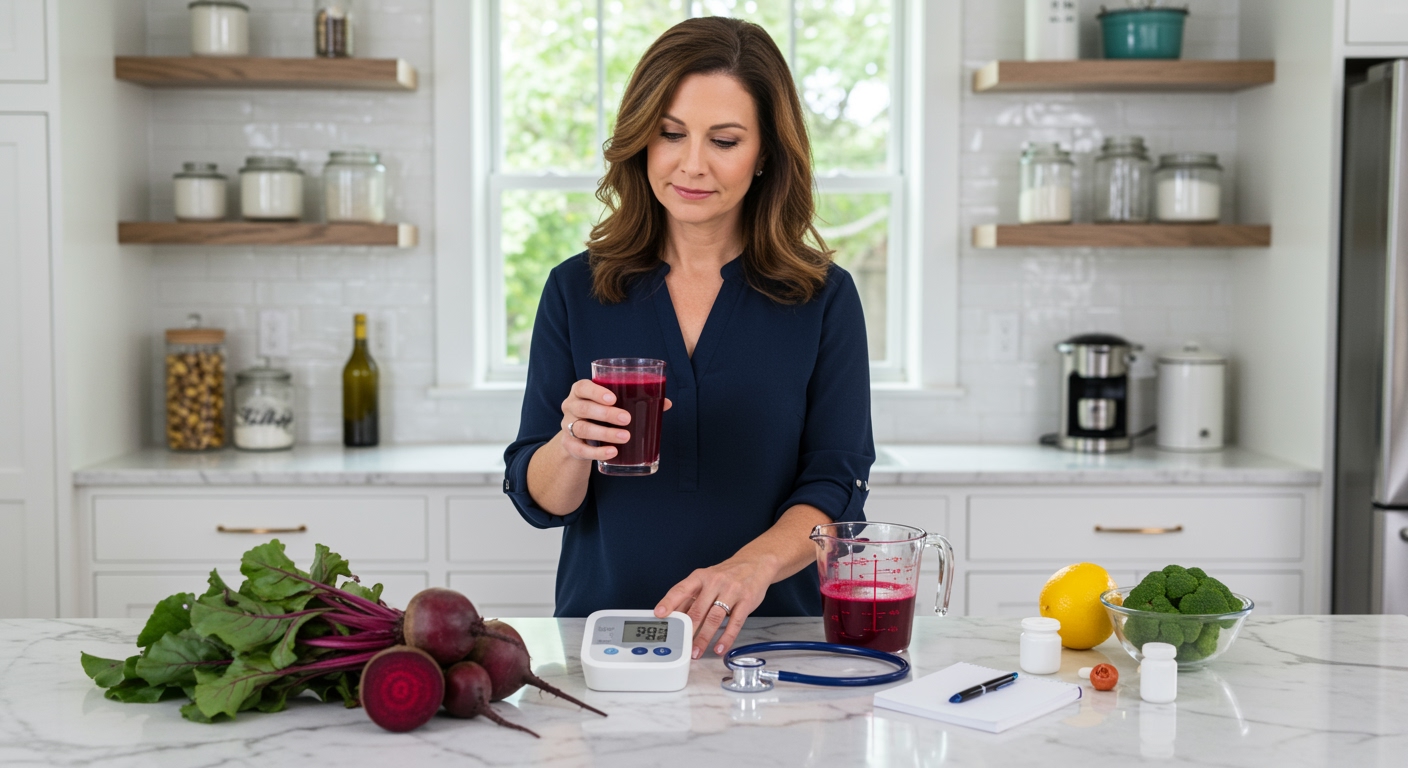✪ Key Takeaway: Beetroot juice can lower blood pressure too much, especially in people already on blood pressure medications.
Introduction
Your friend swears by beetroot juice for lowering blood pressure, but now you feel dizzy and weak after drinking it daily.
You might be wondering if this natural remedy can actually push your blood pressure too low and create new health problems.
Hi, I’m Abdur, your nutrition coach, and today I’m going to explain exactly how beetroot juice affects your blood pressure and when it becomes dangerous.
How Does Beetroot Juice Lower Blood Pressure?
Beetroot juice contains high levels of nitrates that your body converts into nitric oxide.
This nitric oxide acts as a powerful vasodilator, which means it relaxes and widens your blood vessels.
When your blood vessels expand, your heart does not need to work as hard to pump blood through them.
This process naturally reduces the pressure against your artery walls, lowering your overall blood pressure readings.
Research shows that drinking beetroot juice can drop systolic blood pressure by 4-10 mmHg within just 2-3 hours.
The effect peaks around 2.5 to 3 hours after consumption and can last up to 24 hours in some people.
✪ Fact: One cup of beetroot juice contains about 400-500 mg of nitrates, equivalent to eating 2-3 whole beetroots.
Can Beetroot Juice Drop Blood Pressure Too Low?
Yes, beetroot juice can absolutely lower your blood pressure to dangerous levels, especially if you already have low blood pressure or take medications.
Normal blood pressure ranges from 90/60 to 120/80 mmHg, but beetroot juice can push readings below 90/60 mmHg.
This condition, called hypotension, occurs when your blood pressure drops so low that your organs do not receive enough blood flow.
People taking ACE inhibitors, beta-blockers, or diuretics face the highest risk because these medications already lower blood pressure.
The combination creates a compounding effect that can cause your blood pressure to plummet rapidly.
Even healthy individuals with normal blood pressure can experience temporary hypotension if they consume large amounts of beetroot juice on an empty stomach.
✪ Pro Tip: Start with just 2-3 ounces of beetroot juice and monitor your blood pressure for several days before increasing the amount.
What Are The Warning Signs Of Dangerously Low Blood Pressure?
Your body sends clear warning signals when beetroot juice drops your blood pressure too low.
Dizziness and lightheadedness are usually the first symptoms you will notice, especially when standing up quickly.
You might also experience fatigue, weakness, nausea, or blurred vision within hours of drinking beetroot juice.
Some people report feeling confused, having difficulty concentrating, or experiencing rapid shallow breathing.
In severe cases, extremely low blood pressure can cause fainting, chest pain, or irregular heartbeat.
These symptoms indicate that your brain and other vital organs are not receiving adequate blood supply.
If you experience any of these warning signs after consuming beetroot juice, stop drinking it immediately and consult your healthcare provider.
✪ Note: Symptoms of low blood pressure can mimic other conditions, so always measure your actual blood pressure readings.
Who Should Avoid Beetroot Juice For Blood Pressure?
Several groups of people should avoid using beetroot juice as a blood pressure remedy or use it only under medical supervision.
People already taking blood pressure medications face the highest risk of dangerous interactions and should never start beetroot juice without doctor approval.
Individuals with naturally low blood pressure (below 90/60 mmHg) should completely avoid beetroot juice as it can worsen their condition.
Pregnant women should be cautious because pregnancy already affects blood pressure regulation, and adding beetroot juice can create unpredictable effects.
People with kidney stones should also avoid beetroot juice because it contains high levels of oxalates that can worsen stone formation.
Those scheduled for surgery should stop beetroot juice at least two weeks beforehand because it can interfere with blood pressure control during procedures.
✪ Pro Tip: Always inform your doctor about any natural remedies you use, including beetroot juice, before medical procedures.
How To Use Beetroot Juice Safely For Blood Pressure
Safe use of beetroot juice requires careful monitoring and gradual introduction to avoid dangerous blood pressure drops.
Start with just 2-3 ounces of beetroot juice once daily and measure your blood pressure before and after consumption.
Keep a blood pressure log for at least one week to track how your body responds to different amounts.
Never drink beetroot juice on an empty stomach, as this increases the risk of rapid blood pressure drops.
Consume it with food to slow absorption and create a more gradual effect on your cardiovascular system.
If you take blood pressure medications, space beetroot juice at least 2-3 hours away from your medication times.
Stop using beetroot juice immediately if your systolic pressure drops below 90 mmHg or if you experience any symptoms of hypotension.
✪ Note: Home blood pressure monitors are essential tools when using beetroot juice to track your response safely.
The Bottom Line
Beetroot juice can definitely lower your blood pressure too much, creating dangerous health risks that outweigh its benefits for some people.
Natural does not always mean safe, and powerful effects require careful respect and monitoring.
I would love to hear about your experiences with beetroot juice or any questions you have about managing blood pressure naturally in the comments below.
References
At NutritionCrown, we use quality and credible sources to ensure our content is accurate and trustworthy. Below are the sources referenced in creating this article:
- PMC: Beetroot juice supplementation lowers daily systolic blood pressure in older, overweight and obese adults
- Frontiers in Physiology: The Potential Benefits of Red Beetroot Supplementation in Health and Disease
- PMC: Acute and chronic effects of dietary nitrate supplementation on blood pressure and the physiological responses to moderate-intensity and incremental exercise
- WebMD: The Truth About Beetroot Juice





